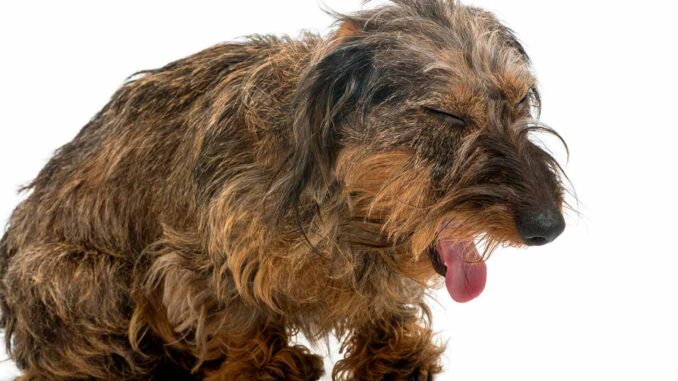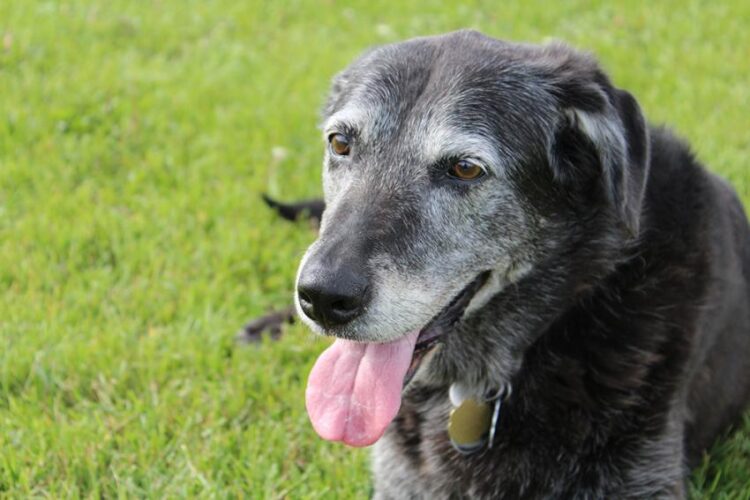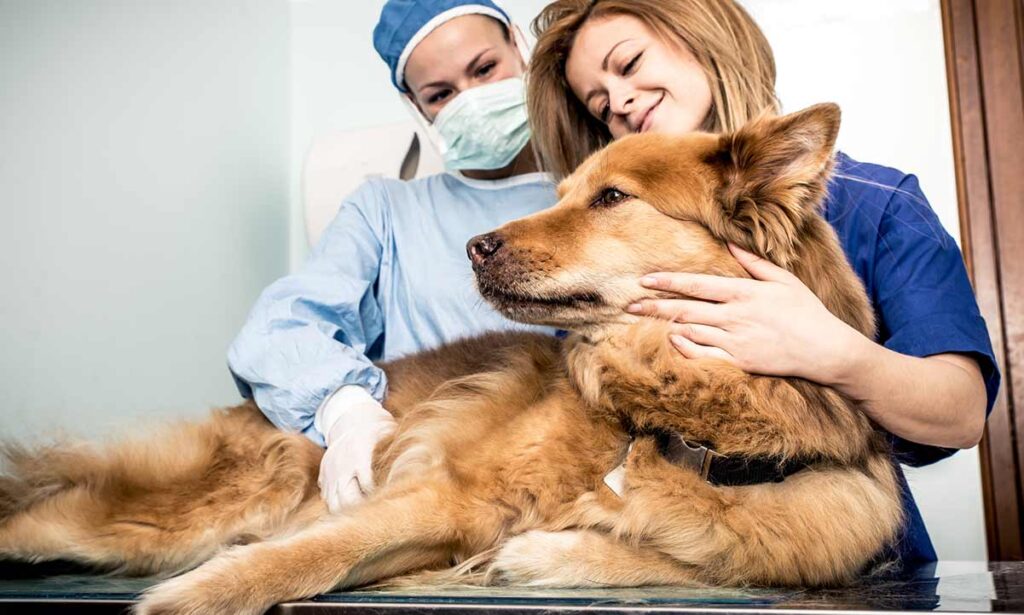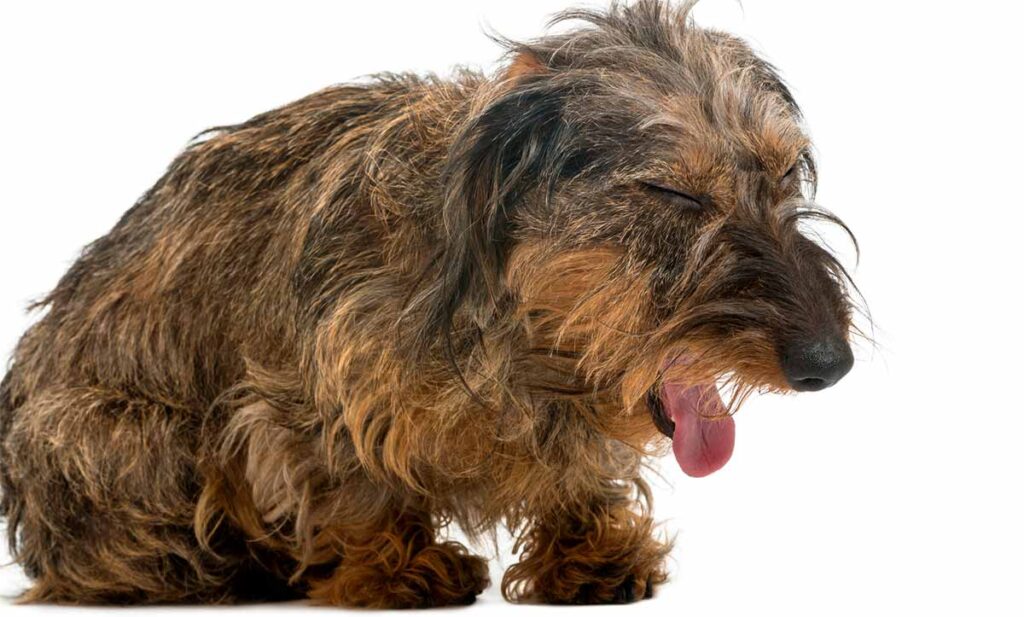
This article was updated on September 25th, 2021
You may have noticed that your old dog started wheezing. Many owners in particular report that wheezing can occur frequently at night. Wheezing is a high-pitched, coarse whistling sound that occurs when your old dog breathe. It is often due to conditions affecting the respiratory systems.
If you’ve recently noticed that your old dog has started to wheeze, it isn’t something that should go ignored. Wheezing, no matter how mild, can be a symptom of a more serious underlying health condition and should be investigated as soon as possible.
Why is Your Old Dog Wheezing?

Wheezing occurs because of abnormal air flow through the airways within your senior dog’s chest. Partial or even complete blockage of the major airways of the lungs, such as the trachea of bronchi, can result in an obstruction to airflow. This commonly creates a loud, higher-pitched breathing sound but wheezing often just refers to a different breathing sound than normal.
Senior dogs that are wheezing will often also appear to gasp for air and may have a faster respiratory rate (the number of breathes they take per minute) – this is because they are struggling to inhale oxygen in and exhale carbon dioxide out of the lungs efficiently.
There are many possible causes of wheezing in older dogs. Some may cause a sudden onset of wheezing and others may result in the more gradual development of an abnormal breathing noise over time.
Regardless of the cause, wheezing and breathing difficulties are never normal and shouldn’t just be put down to ‘old age’. Reduced oxygen delivery into the lungs due to an obstruction can even be fatal; if your dogs gums seem to be turning a blueish colour then they are likely developing a condition known as cyanosis. This is an emergency and you should take your dog to the vet immediately.
Old Dog Wheezing at Night
If your old dog is wheezing at night, it is most likely due to the fact that your dog has been lying down for a long period of time when asleep. At night, your dog’s body is not moving a lot.
Mucus and fluid can build up in the airways and your dog is not actively coughing it up since he or she is sleeping. If your dog is lying on their side, then mucus is likely to build up on that side, preventing airflow into the lung.
Continue to read into the common causes of wheezing to find out why your dog is wheezing at night, and what you can do about it.
Common Causes of Wheezing with Older Dogs
Dogs of any age can wheeze, but older dogs are more likely to wheeze for the following reasons:

Object Blocking the Airway
If your dog has suddenly developed a wheeze and is gasping for breath then they may have inhaled something that is blocking their airways. This is often referred to as a foreign body and can be anything from food to toys to stones that have gone down the wrong pipe. This is an emergency situation as if no air can pass into their lungs then your dog can suffocate very easily. Rush them straight to your local vet if this is the case.
Congestive heart disease
As dogs age, their heart becomes less efficient at pumping blood around the body than it once was. This can be for a number of reasons, from ‘leaky’ heart valves that don’t keep blood moving in one direction within the heart to thickened heart muscle that becomes weaker at contracting.
This results in blood ‘backing up’ within the veins that flow through the lungs causing congestion and liquid can seep into the airspaces as a result. Fluid collecting within the lungs means less space for gas exchange; the fluid in this case is essentially obstructing airflow in and out of the lungs, narrowing the space within the airways, resulting in a wheezing sound.
Symptoms besides wheezing:
Other common symptoms of heart disease include a chesty cough as your dog tries to clear some of that fluid of his chest, tiredness, and a reluctance to exercise. If these symptoms seem to fit with your dog then take them to your local vet.
What can be done about it:
Your vet will listen to your old dog’s heart (a ‘murmur’ could indicate heart disease) and may want to perform chest X-rays and an ultrasound scan of his heart. Fortunately there are many medications available to help dogs with heart disease and the sooner treatment is started, the better the outcome.
While congestive heart disease isn’t curable, the symptoms can be managed to allow your dog to still live a healthy and happy life.
Dog breeds predisposed to heart disease include: Cavalier King Charles Spaniels, Boxers, Great Danes, Dachshunds, Miniature Poodles, Doberman Pinschers and Miniature Schnauzers to name a few.
Chronic bronchitis
Often a slowly developing disease, chronic bronchitis refers to a process in which the airways within the lungs become inflamed, thickened, and turn into scar tissue over time. This inflammatory process results in an excessive build up of mucus and narrowed airways; the smooth muscle within the airways also becomes less elastic over time and more rigid. This results in your dog wheezing. Since your dog’s body is not moving much during sleep, this condition can also cause wheezing at night, when mucus might be building up and your old dog is not actively coughing it up.
Symptoms:
In an attempt to improve airflow through the lungs, your dog may be seen taking deeper breaths and increase the number of breaths they take per minute. Air flowing through a narrow space in the airways produces a wheezing sound.
Dogs with chronic bronchitis will also often cough as they try to clear the mucus that builds up.

What can be done:
Diagnosis is made by X-rays and while there is no cure for chronic bronchitis, the symptoms that your dog shows can be improved with drugs such as corticosteroids to reduce inflammation, and bronchodilators to widen the airways.
Chronic bronchitis most commonly affects small breed dogs but can affect dogs of any shape or size.
Neoplasia
Known to most people as cancer, neoplasia is an unfortunate possibility for any dog as they become more senior. While it shouldn’t be the first diagnosis to jump to when your dog starts wheezing, it is a possibility as the incidence of cancer is much higher in older dogs.
Aggressive cancer anywhere within the body can spread, or metastasise, within the bloodstream and one of the most common sites for spread is the lungs. Cancer can also be a primary condition of lungs, meaning it originated there.
Symptoms:
Besides wheezing, other symptoms of lung cancer include coughing, gasping for air, lethargy, and a reluctance to exercise.
What can be done:
Lung cancer can be diagnosed by taking chest X-rays, and depending on the type of tumour present, might be treatable with chemotherapy drugs. The earlier treatment is started, the better the chances of successful treatment, so take your old dog to the vet at the first sign of wheezing.
Unfortunately, the prognosis in many cases of lung cancer is often poor and so palliative care may be more appropriate.
Infectious airway disease
Lung infection by viruses, bacteria and even parasites can affect dogs of any age, but older dogs may be more susceptible due to a weakened immune system. Concurrent illnesses that affect the lungs can make the delicate cells lining the airways prone to attack resulting in pneumonia.
Inflammation causes thickening of the airways and a build up of pus and mucus reduce the space available for gases to flow in and out of the lungs. Some parts of the lung may even be completely sealed off so that no gas exchange can occur at all. Your senior dog will likely wheeze as he tries to forcibly inhale and exhale to keep up with the body’s oxygen demands. This condition can also cause your old dog to wheeze at night, when mucus can build up as your dog is not coughing it up.
Symptoms:
Dogs with infectious airway disease may also cough and will likely be unwell in themselves and have a fever. You may even see pus-like discharge from their nose.
What can be done:
Treatment of severe infectious airway disease often requires antibiotics and decongestant medications. However, it is important to be aware that there is often another underlying illness that weakened the immune system to allow dangerous microorganisms to take hold in the first place, so this should be investigated.
Kennel cough is another form of infectious airway disease that can affect old dogs, although many dogs will have built up some degree of natural immunity by the time they are senior.
Allergies/asthma
Dogs can get asthma too just like us. If they are exposed to something in the air such as pollen or chemicals that they are allergic to then they may develop asthmatic symptoms. The immune system overreacts to these particles as they are breathed into the lungs, resulting in an inflammatory reaction. A build up of pus and thickening of the airways ensues. The result is a wheezing dog.
What can be done:
Treatment of asthma often requires anti-inflammatory and bronchodilator medication delivered directly to the lungs through a nebuliser – like what asthmatic humans might use. Asthma is generally an easily managed condition with the correct medication and environmental changes; be sure to avoid the use of aerosols, plug-in diffusors, and strong cleaning products around your dog.
More About Wheezing & Wheezing at Night
As you can see, wheezing is a non-specific sign that could indicate several possible underlying diseases. The first step is a thorough veterinary exam and based on your dogs presenting symptoms your vet may also want to perform some chest x-rays to investigate underlying causes.
Most causes of wheezing are treatable if caught early and many have a good prognosis once your dog is on the right medication.
Disclaimer: This website's content is not a substitute for veterinary care. Always consult with your veterinarian for healthcare decisions. Read More.


Be the first to comment